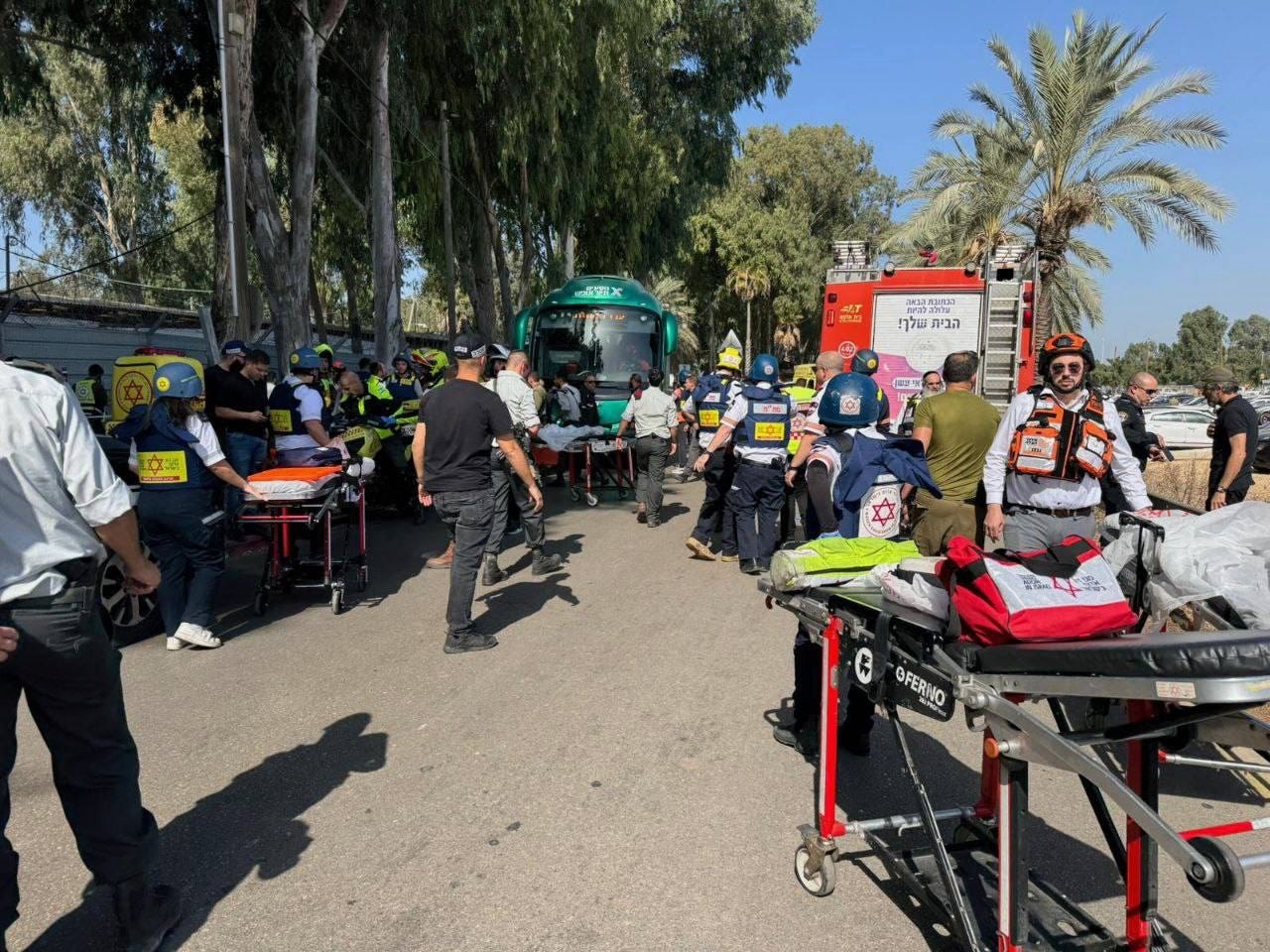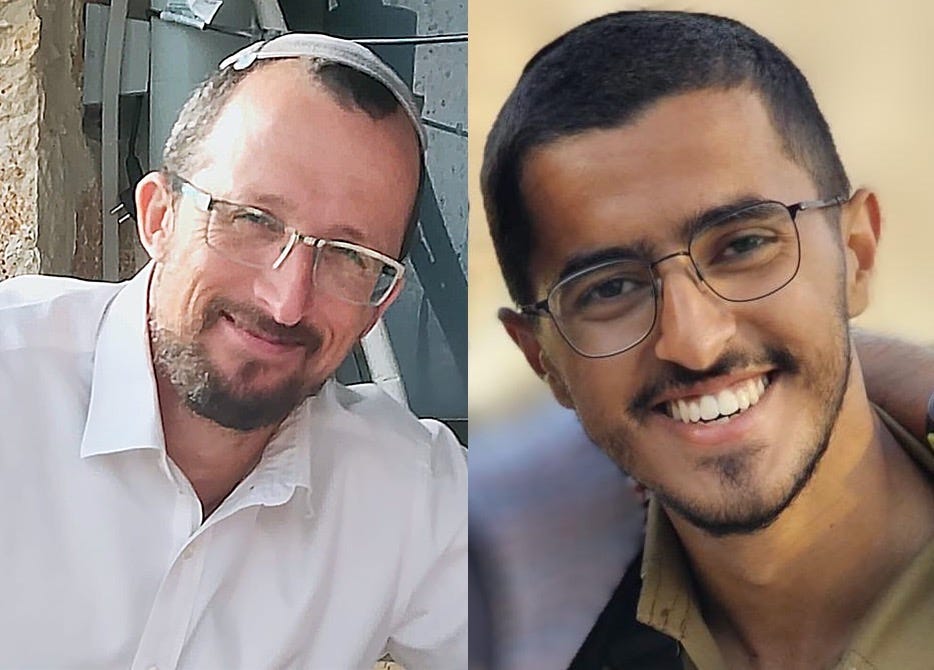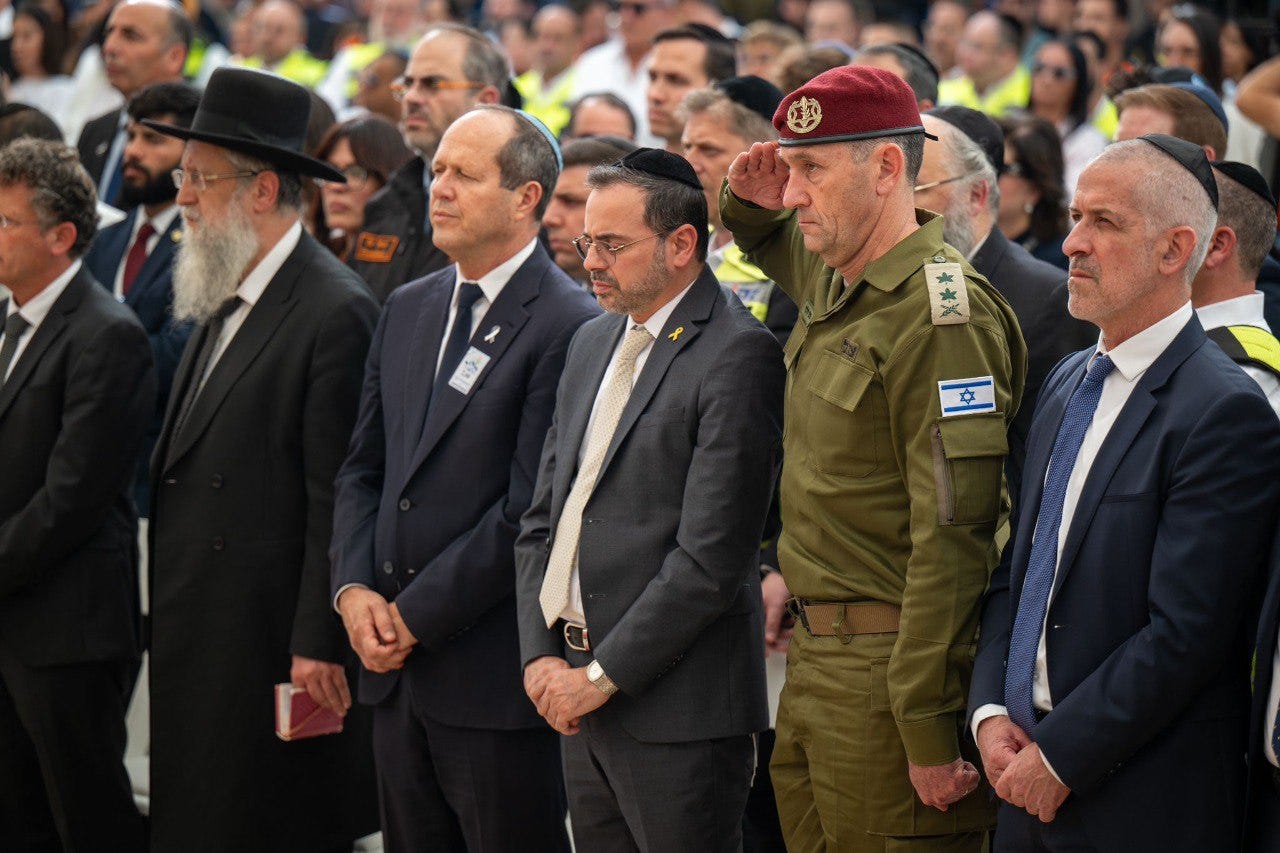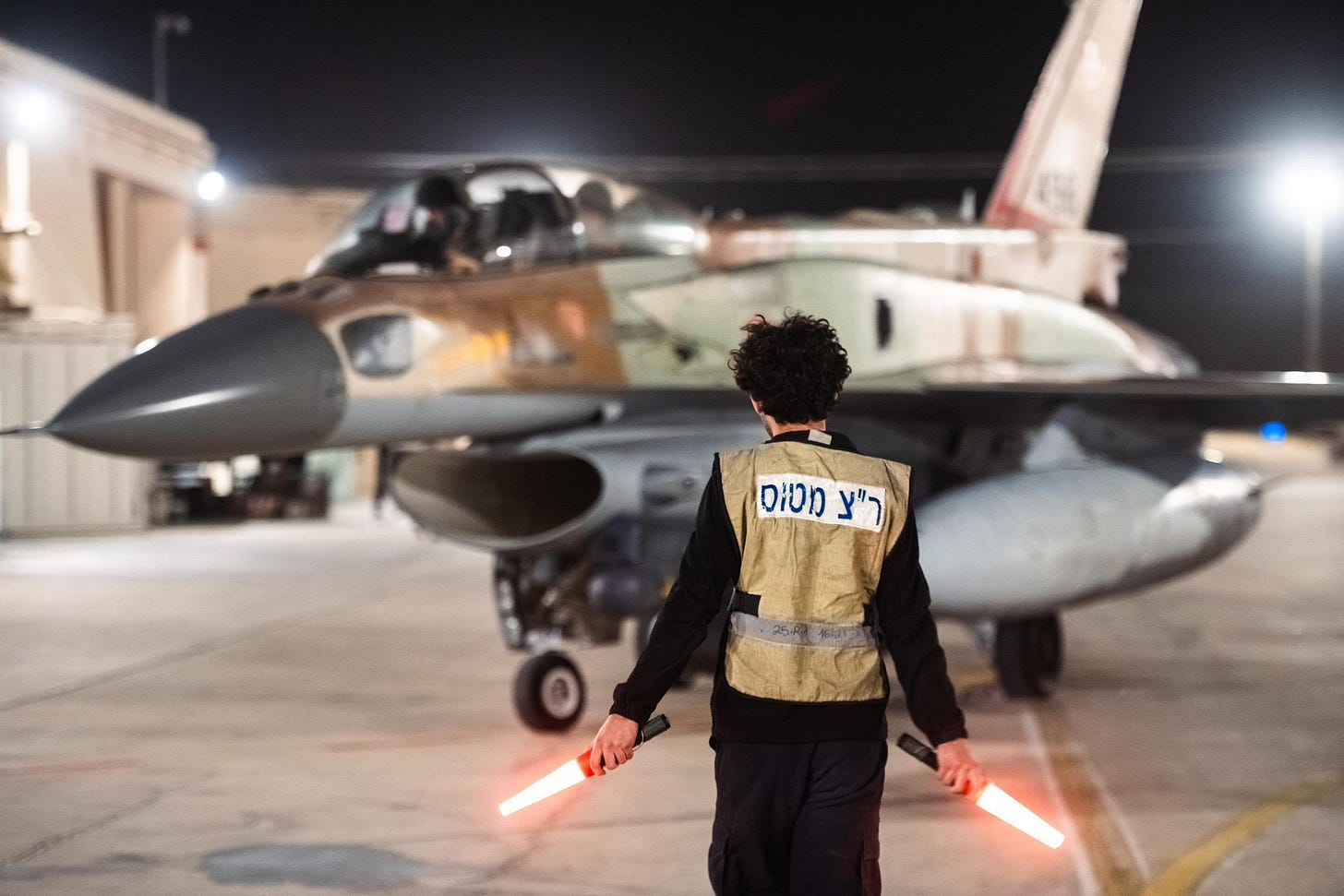DAY 387 OF THE WAR: A Second National Day of Mourning, Six Soldiers Killed in Combat, Terror Attack in Tel Aviv Area, More on Israel’s Attack in Iran
Tel Aviv Diary, October 27, 2024
Today was designated as an official day of mourning for those lost in the war. Nobody quite understood the need for an additional day of the mourning, following the memorials that were already held on October 7th. Most of the country did its best to ignore this second memorial, with almost no business closing their doors, as the government had requested. Nonetheless, official ceremonies were held on Mt. Herzl, one honoring military casualties and another for civilian losses.
While businesses remained open, the media dedicated the day to broadcasting the memorial ceremonies or retelling the stories of those who perished. I am not a psychologist, but it seems to me that an additional national day of mourning was the last thing a country collectively grappling with ongoing trauma needed. Yet, it appears what truly mattered was providing another platform for Netanyahu and others to deliver speeches to publicly “demonstrate” how much they care.
No one here required a memorial service to remind us we were still entrenched in the midst of a terrible, devastating war. This morning, shortly after 8 AM, news outlets reported a suspected ramming attack in Glilot, the location of the major Israeli intelligence base. The location was a road I know well, and it seemed that the truck had plowed into a crowd of individuals near a bus stop, directly outside the base. One person, Betzalel Carmeli (72) was killed and 32 wounded in the incident. It turned out those killed and wounded were retirees on the way to a memorial service for October 7th taking place at the nearby base
.
However, that was hardly the end of the horrible news of the day. Just minutes later, the announcement we dread most was made: “hutar l’pirsum,” meaning "released for publication." It was officially disclosed that not just one, but four soldiers had been killed in Lebanon. This brought the total number of soldiers we have lost in the last four days to 17. We do not need another memorial service to remember our dead; the daily reminders are more than sufficient
.Capt. (res.) Avraham Yosef Goldberg (43), from Jerusalem; Master Sgt. (res.) Gilad Elmaliach (30), from Jerusalem; Capt. (res.) Amit Chayut (29), from Haifa; and Maj. (res.) Eliav Amram Abitbol (36), from Eitan.
The day’s troubling news continued to unfold. Hezbollah launched a drone southward that was not intercepted and landed on the factory roof of a defense contractor. Three people were hurt, none critically. Then later, Hezbollah escalated their attacks by firing 75 rockets at Northern Israel. One of these rockets struck Tamra, seriously injuring a woman.
As I write this update entry, the grim news continued, with the announcement that two more soldiers fell in combat. Sergeant Major (res.) Shaul Moyal (47) from Karnei Shomrom was killed in combat in Lebanon; while First Sergeant Malachi Yehuda Harari (22) from Even Shmueli succumbed to wounds he sustained in Gaza. This brings the total number of fallen solders to since Thursday to 19.
Tonight, we learned that the five IDF soldiers killed in Lebanon perished in a single ambush inside a house in a southern Lebanese village. Three Hezbollah fighters managed to kill the five soldiers and the wounding of six others before they themselves were neutralized. Of the 23 soldiers lost this past week, 16 were reservists. They leave behind a total of 56 children without fathers.
PRESIDENT ISAAC HERZOG
President Herzog delivered the following remarks at today’s official memorial ceremony:
He asked for forgiveness for the failings of the country.
We still face the critical, supreme mission—to urgently bring our hostages home from the hands of the murderers. The elimination of the chief terrorist Sinwar and other enemies, along with the impressive fighting of the IDF and security forces, has created a window of opportunity that we must not miss. We must act with all our strength—in every possible way—with determination, creativity, and courage, to bring the hostages home.
Many of those who have fallen saw this mission as their highest calling; so many fought and are fighting with the images of the hostages in their vests; so many are still doing so—on the home front and at the front lines, on land, in the air, and at sea. The blood of our brothers cries out to us. Their rescue is an overriding and binding command, without which we cannot be whole as a people and as a nation.
Ronen Bar Shabak Chief
Shin Bet Director Ronen Bar issued the following statement today, marking the one-year anniversary of the October 7 massacre:
A year has passed since the State of Israel failed in its most basic duty—to protect its citizens. As an organization tasked with providing security and a sense of safety, we failed to give adequate warning, and we all bow our heads today in respect for those who fell, those who were kidnapped, those who fought, and those we couldn’t save. This day will be dedicated to remembrance, learning, and action on all fronts to make it clear: the massacre did not weaken our resolve to defend the country, its citizens, and its values; on the contrary, it has only strengthened it.
We are committed to ourselves, our employees, and the public that surrounds us to complete the investigation alongside our combat efforts. We are in the midst of a thorough, deep review that will leave no stone unturned. We are already learning, adapting, and making corrections as we investigate. We are examining the causes of the failure and working on the deepest layers that will allow us to minimize the likelihood of similar failures in the future.
The significance of multi-front warfare is felt daily: engaging in combat in Lebanon, disrupting Iranian smuggling routes, foiling assassination plots, cutting off hundreds of terror pathways in the West Bank, thwarting dangerous cyber-attacks, protecting embassies around the world, and above all, fundamentally altering the situation in Gaza.
A significant chapter in this historic war began a year ago, at 06:29 AM. When the first alarms sounded, the combat teams dispatched in the early hours intercepted dozens of terrorists on their way to Ashkelon, and as soon as the magnitude of the event became clear, all of Shin Bet mobilized. Among you were those who rushed into Kibbutz Kfar Aza to rescue residents, those who helped stop the assault on Mefalsim, and those who fought in Re’im—some on the ground, some in the command center.
Some of you were involved in the fighting, others worked to prevent additional fronts from joining the conflict, and within hours, you had established a command center for locating captives and missing persons—the NILI command center, which to this day continues to pursue every perpetrator of the horrific massacre, one by one, until we reach them all, along with command centers to neutralize senior operatives.
Despite the intelligence failure, we witnessed acts of heroic combat, rapid recovery, determination to engage, and relentless fighting—from that day to this. October 7, 06:29 AM—that is exactly the moment that tests an organization’s resilience and endurance, and Shin Bet, from its greatest point of failure, has proven to be unbreakable.
What makes an organization unbreakable are its values and capabilities.
An organization where leaders lead from the front—both in the investigation and on the battlefield.
An organization that is committed first to the country, then to itself and its individuals.
An organization that knows how to deploy to any arena and focus on every mission.
An organization that understands that until the last hostage is returned, the lights will stay on.
This is the organization that the people of Israel want to continue defending them—even when it has failed.
On that day and since, the country lost its best sons and daughters. Since that day, we too have lost our finest. Through our work, by turning the tide, and by restoring deterrence and security, we will prove ourselves worthy of them.
IDF AIR FORCE STRIKES: LEBANON AND GAZA
Despite mounting losses, the IDF continues to achieve successes in Lebanon. The IDF Spokesman released the following statement regarding operations in Lebanon:
Overnight, Air Force fighter jets, guided by precise intelligence from the Intelligence Directorate, struck sites in Beirut’s Dahiya used for the production and maintenance of weapons, as well as a weapons depot belonging to the Hezbollah terror organization.
In the past 24 hours, Air Force fighter jets, under the guidance of the Northern Command, eliminated around 70 terrorists and struck more than 120 Hezbollah terror targets.
Air Force fighter jets attacked military infrastructure used by Hezbollah’s 127th air unit and a terror cell from the unit in southern Lebanon.
During operations by Division 146 forces, in a rapid engagement, an Air Force aircraft attacked a building from which terrorists were identified shooting at the operating force.
Simultaneously, Division 162 forces continue to operate in the Jabalia area of the Gaza Strip, eliminating over 40 terrorists in the past 24 hours. Givati Brigade fighters operating in the area destroyed terror infrastructure and discovered extensive military equipment.
Within 24 hours: The IDF eliminated the commander of the Bint Jbeil region and his successor in Hezbollah.
Two days ago, Air Force fighter jets, guided by Northern Command intelligence, targeted and eliminated Ahmad Jaafar Matouk, the Hezbollah commander of the Bint Jbeil region.
A day later, Air Force fighter jets, again guided by Northern Command intelligence, struck and eliminated his successor. Additionally, this strike killed the artillery officer responsible for the Bint Jbeil sector within Hezbollah.
ISRAEL’S RETALIATORY STRIKE ON IRAN
Some further details have emerged about the attack on Iran. There seems to now be confirmation that Israel successfully destroyed a facility responsible for producing missile fuel in Iran, and the equipment damaged is likely difficult to replace. In another noteworthy development, it was revealed today that the U.S. was operationally prepared during the attack to rescue any Israeli pilots who might have been downed during the attack
.
It should be noted that when Russia first sold their advanced anti-aircraft systems to Iran in 2007, the IAF was so concerned about the system’s capabilities that Israel attempted to block the sale. However, since then the IDF learned how to deal with those weapons. Back in 1981, we defeated the Soviet anti-aircraft systems in Syria in one day— a major embarrassment to the then Soviet Union. Israel’s recent strike on Iran will have similar impact on the Russians of today. As recently as 2013, when planning an attack on the Iranian nuclear program, the IAF estimated Israel might lose as many as 40 planes in the strike, thus, Friday night’s results—with no aircraft lost—all the more remarkable.
DEFENSE SECRETARY AUSTIN TO DEFENSE MINISTER GALANT
Defense Secretary Loyd Austin spoke with Defense Minister Gallant yesterday: Here is the readout from their conversation:
Secretary of Defense Lloyd J. Austin III spoke with Israeli Minister of Defense Yoav Gallant today to discuss the Israel Defense Forces' overnight precision strikes on military targets in Iran. The Secretary reaffirmed — as he did in the aftermath of Iran's brazen attack on Israel on October 1 — the United States' ironclad commitment to Israel's security and support for its right to defend itself. Secretary Austin pointed to the recent deployment of a Terminal High-Altitude Area Defense (THAAD) battery to Israel as an example of these commitments. The Secretary emphasized that the United States is well postured to defend U.S. forces, facilities, and partners across the region and determined to prevent any actor from exploiting tensions or expanding the conflict in the region. He told the Minister that Iran should not make the mistake of responding to Israel's strikes, which should mark the end of this exchange. The Secretary also discussed the opportunities that now exist to use diplomacy to dial down tensions in the region, including a hostage release and ceasefire deal in Gaza and an agreement in Lebanon that allows civilians on both sides of the Blue Line to return safely to their homes.
The Iranians continue to downplay the effectiveness of the attack. Today, the President of Iran said that they are not looking for a war, but are prepared. Others said that the response will come when they decide it’s a good time to do so. What’s clear is that their threat to respond immediately is not going to take place.
Doron Kadosh, Army radio’s (GALATZ) military correspondent, summed up what we currently know about Israel’s attack on Iran:
1. The strike destroyed all of Iran’s strategic air defense capabilities. This means all long-range surface-to-air missile batteries. Iran had two such models: the Russian S-300 and another advanced Iranian-made model. All batteries were destroyed, along with long-range detection radars. Essentially, Iran is now left only with short-range air defense batteries of local Iranian models.
2. The primary damage to the air defense batteries occurred in Tehran and western Iran. In Tehran, this means the Iranian capital has been left exposed and vulnerable. Western Iran is the area from which Iran launched ballistic missile attacks toward Israel, so the destruction there has operational benefits for future actions.
3. IDF assessment: Iran has lost its strategic air defense capabilities for the next two to three years. Russia will be unable to supply replacement systems due to the ongoing war in Ukraine, and it will take Iran significant time to manufacture new systems of their own model.
4. According to reports, Iran possesses over 2,000 long-range ballistic missiles. The existing arsenal was not affected—only the production capabilities for new missiles were impacted (including equipment like planetary mixers). This means Iran will now need to manage its ammunition carefully, as its current missile stockpile will not be able to grow in the near future (months or possibly years).
5. Contrary to various reports, Iran’s drone fleet was not affected.
6. Over 140 aircraft participated in the strike. More than 50% of the pilots and navigators involved were reservists.
7. The IDF anticipated that Iran might respond with a barrage of 200 ballistic contingency plan that would allow them to both defend against such an attack and complete all three waves of the strike without abandoning any target. Ultimately, the Iranians chose not to respond immediately. A senior defense official commented: “The more time passes without a response, the more likely it is that they are conducting damage control, thinking strategically rather than impulsively, and carefully considering their next steps.
8. Preparations for a potential Iranian response: This time, the Americans are expected to play a more significant role in defense and interception, both due to the THAAD battery stationed in Israel and three ships equipped with AEGIS defense systems, capable of intercepting ballistic missiles, which were also involved in intercepting attacks in early October.
HOSTAGES
Some additional developments continue to progress with hostage negotiation talks. Today, the President of Egypt presented a plan for a two-day ceasefire, during which four hostages would be released, followed by ten days of negotiations to secure the release of the remaining hostages. It has also been reported that Hamas proposed a plan to release all hostages in exchange for an Israeli withdrawal from Gaza and the release of Palestinian terrorists. Hamas is also reportedly open to other proposals. Negotiations are set to begin tonight in Qatar.
Defense Minister Gallant spoke at a memorial service today, and stated: “Not every goal can be achieved solely through military means. When we fulfill the moral and ethical duty to bring the hostages home, we will need to make painful compromises.”
I am not optimistic. However, this is the first time in two months that any negotiations to secure release of the hostages are taking place. The Israeli public overwhelming favors reaching a hostage release agreement.
Note: 73% of Israelis are willing to end the war in return for the hostages, 14% are against ending the war, while 13% have no opinion.
BUSINESS
Lidwave, a Jerusalem-based startup founded in 2021 by three physicists from Hebrew University, is developing innovative lidar sensors for autonomous vehicles. Lidwave recently announced a $10 million seed funding round led by Jumpspeed Ventures and Next Gear Ventures, along with a strategic investment from a Swedish truck manufacturer. Despite entering a crowded and challenging market where even established companies struggle to gain traction, Lidwave believes its technology offers a competitive advantage.
Lidwave's breakthrough lies in its proprietary Finite Coherent Ranging (FCR™) technology, which integrates all critical components onto a single chip using coherent optics principles. This approach significantly simplifies the production process and reduces costs compared to traditional lidars that require complex calibration and multiple components. According to Lidwave CEO Yehuda Vidal, their system requires less light transmission while maintaining high sensitivity, resulting in lower power consumption and improved measurement capabilities
.
While the automotive sector is a key target, Lidwave is initially focusing on markets that may offer quicker adoption, including logistics, industry, robotics, manufacturing, and mining sectors. Lidwave, which currently employs 18 people at its Har Hotzvim offices, plans to release test models in early 2025 and begin mass production in the second quarter of 2026. This strategic approach, combined with support from various investors and the Israel Innovation Authority, positions Lidwave to potentially disrupt the lidar sensor market.
∞–––––∞–––––∞––––∞––––∞––––∞––––∞––––∞––––∞––––∞
A PIECE OF HISTORY
The Winograd Commission
2007 was a year marked by the continuing repercussions of the Lebanon War. On January 17th, Chief of Staff Dan Halutz announced his resignation, and General Gabi Ashkenazi succeeded him. Both the political and military sectors anxiously awaited the findings of the Winograd Commission, which was established to investigate Israel's handling of the 2006 Lebanon War. The Winograd Commission’s interim report was issued on April 30, 2007, containing many conclusions that would be reiterated in the final report released on January 30, 2008. The report delivered a thorough assessment of the conflict.
The Winograd Commission praised the Israeli Air Force (IAF) for its precise targeting and intelligence in neutralizing Hezbollah’s medium and long-range rockets. However, it criticized the ground forces, noting their performance as found severely lacking, due to inadequate preparedness, coordination, and leadership, which contributed to an inconclusive outcome. The commission pointed out that the IDF's excessive reliance on air power, without adequate ground engagement, resulting in strategic shortcomings.
The commission’s most pointed criticism was directed at leadership failures. Prime Minister Ehud Olmert, Defense Minister Amir Peretz, and IDF Chief of Staff General Dan Halutz were held accountable for launching a full-scale war without clear strategic objectives or adequate preparation. Halutz, in particular, faced criticism for his impulsive decision-making and his failure to communicate the IDF’s limitations to the civilian leadership. The leadership’s misplaced reliance on airpower, coupled with poor decision-making, led to a failure to neutralize Hezbollah’s short-range rockets, which continued to bombard northern Israel.
The commission identified strategic flaws in the IDF’s reliance on a new doctrine that emphasized precision standoff attacks without accompanying ground operations, deeming it a miscalculation. The commission identified the absence of a comprehensive operational plan for ground offensives, which resulted in disjointed actions that failed to halt Hezbollah's rocket fire. Furthermore, the failure to fully engage ground forces and the tendency to halt operations due to casualty aversion significantly undermined the military's overall effectiveness.
The commission also emphasized the IDF’s inadequate adaptation to fighting a guerrilla force such as Hezbollah. The emphasis on Palestinian terror operations in the preceding years had left the IDF ill-equipped for the scale and complexity of the conflict in Lebanon. Deficiencies in joint air-ground training and integration exacerbated the situation, contributing to Hezbollah’s resilience throughout the war. The ground forces’ failure to make decisive advances into southern Lebanon highlighted the IDF’s tactical missteps.
Despite the successes of the IAF, the commission concluded that Israel failed to achieve a decisive victory in the war. The persistence of Hezbollah’s rocket attacks until the ceasefire exemplified the IDF’s inability to deliver a conclusive blow. The war was seen as a missed opportunity to significantly weaken Hezbollah. The commission stressed that a fully integrated, combined-arms approach could have led to a more favorable outcome, albeit at a higher cost.
In conclusion, the Winograd Commission determined that Israel entered the war unprepared for its challenges. The combination of poor leadership, over-reliance on airpower, and a failure to adapt ground operations to the nature of the conflict resulted in significant strategic shortcomings. These findings had a profound impact, prompting to key resignations and reforms within Israel’s military and political leadership. The Winograd commission’s recommendations emphasized the need for better planning, coordination, and adaptation to asymmetric warfare to prevent similar failures in the future.









